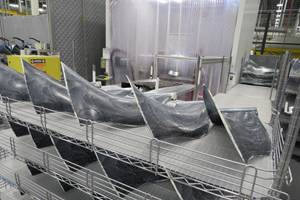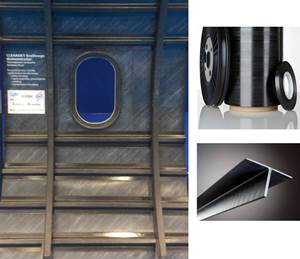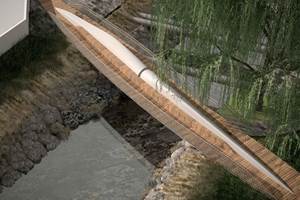European SAMPE meeting explores composites innovation
High spots from SAMPE Europe’s Summit 17.
SAMPE Europe’s one-day Summit 17 Paris conference, held the day before JEC World 2017 opened, took place in the Hotel Pullman Paris Tour Eiffel penthouse meeting room, with the famed Eiffel Tower dominating an expansive view (see photo). Its solid lineup of speakers delved into Automotive, Advanced Manufacturing, Advanced Materials and Aerospace topic areas. In the Automotive block, SABIC's (Pittsfield, MA, US and Sittard, The Netherlands) Warden Schijve, chief scientist for composites, demonstrated that the “sweet spot” for composites in cars could be hybrids of small but strategically placed continuous-fiber preforms overmolded with chopped fiber-filled matrices in injection molding processes, to minimize vehicle weight. He discussed demonstrator projects that involve such hybrids in a cross-car beam and side door beam, both made by overmolding continuous fibers, pointing out that OEMs might be willing to pay €2-€3 (US$2.15-US$3.22) per kg of weight savings: “Performance is not the issue,” he insisted. “It all comes down to cost.”
Per Mårtensson, technical specialist for composite structures body-in-white at Volvo Car Corp. (Göteborg, Sweden), gave a compelling presentation from the OEM point of view about adoption of composites in cars. He reminded attendees that steel-centric manufacturing becomes less expensive as part count climbs, due to scale effects (reduction of fixed costs), but because most of carbon fiber’s production cost is the material price, there are no scale effects. For this reason, he emphasized that composites must be integrated into systems. He used the Volvo glass fiber-reinforced leaf spring (see CW’s coverage of this program) as an example, which allows part consolidation and reduces the variability seen in legacy springs. Mårtensson described a possible way forward, in a single vehicle platform with exchangeable parts for model diversity: “This solves the scaling problem, since the platform would be mostly steel, made in high volume, whereas the lower-volume, exchangeable elements, such as body panels, could be made with composites.”
Steven Bakker, head of R&D and application services at SAERTEX GmbH & Co. KG (Saerbeck, Germany), described the design and fabrication of the 40m-long carbon composite Seasight catamaran, Vision of the Fjords, built by Brødrene Aa (Hyen, Norway). Suppliers for the fast-tracked project included SAERTEX, for the carbon fabric reinforcements, DIAB International AB (Laholm, Sweden), for the core material in the sandwich laminates, and Reichhold LLC2 (Research Triangle Park, NC, US), for the vinyl ester resin. The vessel was vacuum infused, and the carbon fiber composite design is 50% lighter than legacy materials (and therefore uses less fuel during operation, a key project goal). Vision of the Fjords, powered by hybrid-electric motors, won the 2017 JEC World Innovation Award in the “Better Living” category and is used for tourist excursions in Nærøyfjord, a UNESCO World Heritage-listed fjord.
Luciana Selmi Marques, composites R&D project manager at Embraer SA (Sao Paolo, Brazil), discussed the use of composites on her company’s aircraft and at the company’s new composites center in Evora, Portugal. Citing 20% composites usage on its aircraft, currently, Marques indicated that Embraer is considering moving to more composite elements, potentially full fuselages and wings on some models, although final decisions haven’t been made.
The Boeing Co. (Chicago, IL, US) was represented by senior technical fellow Dr. Gary Georgeson, responsible for nondestructive advanced inspection research and technology. He emphasized that composites designers need to design not only for performance but also for inspection and inspectability, and that NDI is a tool that can ultimately improve manufacturing. NDI is continuing to move upstream into the manufacturing process, for better process control, he noted.
On the Airbus (Toulouse, France) side, Axel Flaig, senior VP of research and technology, gave an overview and some examples of current Airbus initiatives that are pushing innovation and material improvements. Programs for multifunctional components and structures, more out-of-autoclave processing and optimized additive manufacturing are all underway, as are electrical propulsion, hybrid engines and open rotor engine designs. Structural health monitoring and full digital production for factories are also moving forward, although implementation is several years away. There is a “large design space” he noted, to go beyond merely improving the original 707 flying tube with wings — Airbus sees many possible aircraft configurations.
SAMPE Europe will hold its next event, Conference 2017 Stuttgart, Nov. 14-16, in Stuttgart, Germany.
Related Content
Combining multifunctional thermoplastic composites, additive manufacturing for next-gen airframe structures
The DOMMINIO project combines AFP with 3D printed gyroid cores, embedded SHM sensors and smart materials for induction-driven disassembly of parts at end of life.
Read MorePlant tour: Albany Engineered Composites, Rochester, N.H., U.S.
Efficient, high-quality, well-controlled composites manufacturing at volume is the mantra for this 3D weaving specialist.
Read MorePEEK vs. PEKK vs. PAEK and continuous compression molding
Suppliers of thermoplastics and carbon fiber chime in regarding PEEK vs. PEKK, and now PAEK, as well as in-situ consolidation — the supply chain for thermoplastic tape composites continues to evolve.
Read MoreRecycling end-of-life composite parts: New methods, markets
From infrastructure solutions to consumer products, Polish recycler Anmet and Netherlands-based researchers are developing new methods for repurposing wind turbine blades and other composite parts.
Read MoreRead Next
All-recycled, needle-punched nonwoven CFRP slashes carbon footprint of Formula 2 seat
Dallara and Tenowo collaborate to produce a race-ready Formula 2 seat using recycled carbon fiber, reducing CO2 emissions by 97.5% compared to virgin materials.
Read More“Structured air” TPS safeguards composite structures
Powered by an 85% air/15% pure polyimide aerogel, Blueshift’s novel material system protects structures during transient thermal events from -200°C to beyond 2400°C for rockets, battery boxes and more.
Read MoreDeveloping bonded composite repair for ships, offshore units
Bureau Veritas and industry partners issue guidelines and pave the way for certification via StrengthBond Offshore project.
Read More






















